- (Free MP3) ‘스마트폰 닥터’ 시대가 온다
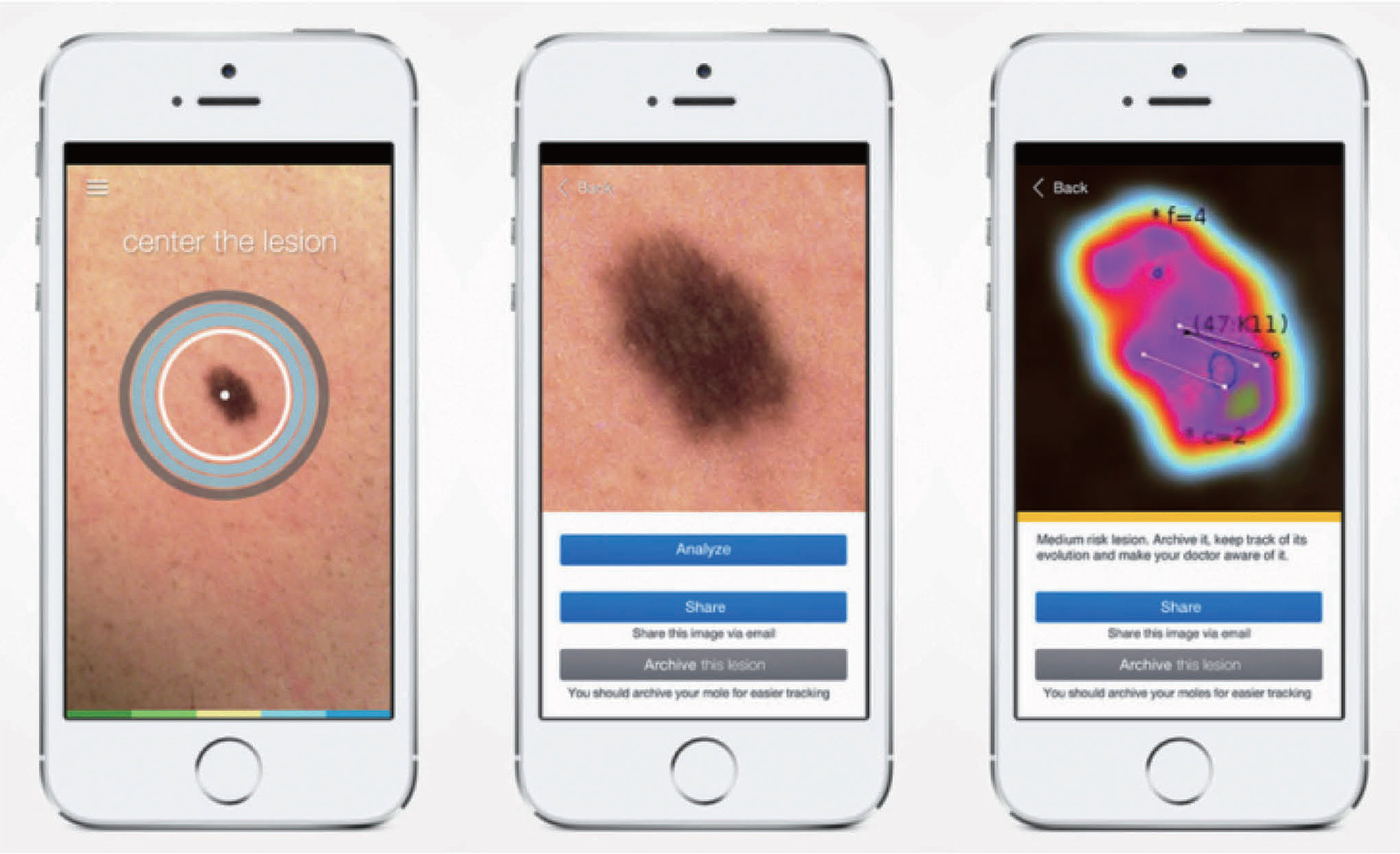
CAN SMARTPHONES REPLACE YOUR GP?
New medtech apps put specialist knowledge in patient’s pockets.One evening in late 2013, Brice Beakley wasn’t feeling very well. The 15-year-old from Doylestown, Pennsylvania, had been hit by a hard tackle at football practice earlier in the day and still hadn’t recovered. Not knowing what else to do, he picked up his iPad and Googled his symptoms: upper abdominal pain and left shoulder pain. Doctors later credited the search engine with saving the teenager’s life.
What Google’s results told Beakley was that he had ruptured his spleen, a potentially fatal occurrence that requires immediate medical intervention. After being rushed to the hospital by his parents, doctors performed emergency surgery to remove the spleen. Beakley was saved.
While Beakley’s case may be exceptional, it illustrates an ever-increasing reliance on consumer technology when it comes to healthcare. The problem with searching symptoms through Google, however, is that the benefits are often outweighed by the downsides. People are often presented with the worst case scenario and search results can undermine medical authority.
This is what a new generation of apps is aiming to fix. The apps combine a smartphone’s sensors with the vast power of cloud computing in order to accurately diagnose a disease or illness - ranging from skin cancer to eye disease. In some cases, the app’s creators claim that the technology performs better than the average GP, potentially paving the way for apps to skip primary healthcare altogether and refer patients directly to specialists for immediate treatment.
“I believe that GPs play a very vital role as the first point of contact for people when they become sick or worry about something,” Dick Uyttewaal, the CEO of SkinVision, told IBTimes UK. “But there is an awful lot of work that they currently do where they don’t add value and that could be replaced by technology.
Uyttewaal’s SkinVision app links a smartphone’s camera to an algorithm capable of detecting melanoma. A study published in the Journal of the European Academy of Dermatology and Venereology found that the app was 81% accurate in recognising skin cancer, bringing “the average eye of a dermatologist” to a smartphone. “That could mean that certain people with a certain risk profile could be directly sent to a dermatology consultant instead of first being seen by a GP,” Uyttewaal said.
‘PROFESSIONAL AND PATIENT CAUTION’The sudden emergence of this technology means that the regulation surrounding it is a long way behind where it needs to be. Before overburdened GPs can have their workload reduced through such apps, this issue will need to be addressed.
Professor Maureen Baker, the Chair of the Royal College of General Practioners, believes that while such apps can prove helpful in providing knowledge or advice, the current lack of safety standards in the UK mean they could never be put to use in any meaningful way.
“There are many functions that apps can bring into medicine and we should welcome and explore that but at the moment there’s still probably a reasonable degree of professional caution and indeed public and patient caution,” Baker told IBTimes UK. “People want to know: Is it safe? Can we trust it? Is it reliable? Kitemarking or assurance in general isnt’ readily available, either to patients or to professionals. The medical regulatory framework that we now have for medical devices is not fit for purpose for 21st Century apps and the way in which technology is evolving. And that’s a problem.”
Following a study at the Ludwig-Maximilians-Universitat Clinic in Germany, SkinVision became the first skin cancer app to be CE marked for usage in the European Union, though this has little practical application when it comes to being able to refer people directly to a dermatologist. Instead, Utteywaal hopes that the SkinVision will be used as a complementary tool to existing medical detection methods, rather than a replacement.
“The issue with medical studies is that technology is fixed before the study starts and the study took one year with the publication going live in 2014,” Uyttewaal said. “In contrast in the app development sector a lot of change happens in two and a half years and the world is completely different.
“We want the app to bring people into the healthcare system who otherwise might not be. There is a risk of false positives or false negatives — though none have been reported yet — so the online assessment is part of a wider journey for the customer.”
‘COMPUTERS CAN’T MAKE ETHICAL DECISIONS’Another of the biggest limitations with current medtech apps is the inability to understand a patient’s condition within a broader context. Rob High, chief technology officer of IBM Watson (of Jeopardy! fame), believes that despite advances in artificial intelligence, computers remain very limited in scope.
Speaking to IBTimes UK at the recent Hello Tomorrow conference in Paris, High said: “Computers can’t make the ethical decisions that a doctor can on a broader scale, for example the knowledge that a patient has a sick daughter and therefore one course of treatment should not be chosen over another despite it being more beneficial as it would put them out of commission for a few days a week - leaving her unable to care for her daughter.”
This idea of placing information in context is one shared by Baker, who also claims that a patient-doctor relationship can be therapeutic for the patient. According to Baker, trust plays an important role in assisting a person’s recovery or handling of an illness.
“These days, people very rarely have just one thing wrong with them at any one time,” Baker said. “Certainly machines, no matter how good they are, are nowhere near being able to handle that complexity at the moment, and nor are they likely to. I don’t see machines replacing a significant proportion of doctors - not in the next five to ten years, and I think probably not for many years, if ever.”
‘스마트폰 닥터’ 시대가 온다
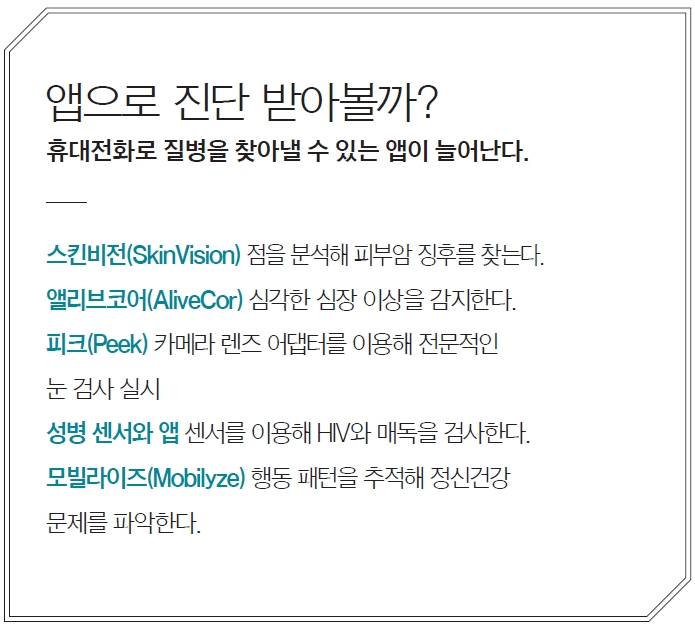
피부암과 안과 질환 등 진단하는 앱 속속 등장하며 정확도 높아져2013년 말 어느 날 저녁 브라이스 비클리(15)는 몸 상태가 몹시 좋지 않았다. 미국 펜실베이니아주 도일스타운에 사는 그는 낮에 미식축구 연습을 하던 중 강한 태클을 받은 뒤 통증이 계속 가시지 않았다. 어떻게 해야 할지 몰랐던 그는 아이패드를 집어 들고 구글에서 자신의 증상을 검색했다. 복부 위쪽과 왼쪽 어깨에 통증이 있었다. 훗날 검색엔진 덕분에 목숨을 건졌다고 의사들이 그에게 귀띔했다.
비클리가 구글을 검색한 결과는 비장 파열이었다. 응급처치를 요하는 잠재적으로 치명적인 증상이다. 부모가 그를 급히 병원 응급실로 데려가 비장 제거수술을 받았다. 구사일생으로 목숨을 건졌다.
예외적인 경우지만 비클리의 사례는 건강의료 분야에서 갈수록 소비자 IT에 의존하는 추세를 단적으로 보여준다. 그러나 구글을 통한 증상 검색 방법에는 문제가 따른다. 종종 장점보다 단점이 더 크다는 사실이다. 때때로 검색 결과가 최악의 시나리오를 제시하고 의료의 권위를 해칠 수 있다는 점이다.
이 문제를 해결하기 위한 신세대 앱이 속속 등장하고 있다. 이 앱들은 스마트폰 센서와 클라우드 컴퓨팅의 엄청난 위력을 결합한다. 피부암부터 안과 질환에 이르는 질병과 신체이상 진단의 정확성을 높여가고 있다. 어떤 경우에는 이 기술이 일반의보다 더 뛰어나다고 앱 개발자들은 주장한다. 이런 앱들이 일차 진료를 건너뛰고 환자를 곧바로 전문의에게 연결시켜 치료받게 하는 길을 열고 있다.
“몸이 아프거나 병이 걱정되는 사람에게 일차 진료자로서 의사의 역할은 대단히 중요하다”고 스킨비전의 CEO 딕 위테왈이 IB타임스에 말했다. “하지만 그들이 담당하는 일 중에는 부가가치가 높지 않아 IT 기술로 대체할 수 있는 부분이 대단히 많다.”
위테왈 CEO의 스킨비전 앱은 흑색종을 찾아내는 알고리즘에 스마트폰 앱을 연결한다. 최근 ‘유럽 피부과학회지(Journal of the European Academy of Dermatology and Venereology)’에 발표된 실험 결과에서 그 앱이 81%의 정확도로 피부암을 가려냈다. 스마트폰에 ‘피부과의사의 눈’을 달아준 셈이다. “그것은 특정한 위험 특성을 가진 특정 환자의 경우 일반의의 진찰을 건너뛰고 직접 피부과 전문의로 연결될 수 있다는 의미”라고 위테왈 CEO가 말했다.
‘전문의와 환자 모두 불안 느껴’이 같은 기술이 급부상하는 동안 관련 규제는 그 속도를 따라잡지 못하고 있다. 의료 앱으로 일반의의 과중한 진료 부담을 덜어주기에 앞서 이 같은 문제부터 해결해야 한다.
그런 앱들이 의료지식이나 조언을 제공하는 데 도움이 될 수 있지만 안전 기준이 없어 실용성이 크게 떨어질 수도 있다고 영국 가정의학회 회장인 모린 베이커 교수는 지적했다. 그는 “앱이 의료에 더할 수 있는 기능은 많다. 그런 점을 받아들여 활용 가능성을 탐구해야 한다”면서도 “현재로선 일반인이나 환자 모두 상당히 조심스런 입장”이라고 IB타임스에 말했다. “사람들은 불안해 한다. 안전한가? 믿을 수 있는가? 정확한가? 환자나 의료 전문가가 전반적인 품질을 공식적으로 인증 받기는 어렵다. 의료기기를 대상으로 하는 규제 프레임워크가 21세기의 앱, 그리고 IT 기술의 진화방식에 적합하지 않다는 점이 문제다.”
스킨비전은 피부암 앱으로는 처음으로 유럽연합(EU) 내 판매 목적으로 CE 마크(유럽연합 제품안전 마크)를 받았다. 독일 루드비히-막시밀리안스대학 병원에서의 조사를 거친 뒤였다. 하지만 환자를 피부과 의사에게 곧바로 연결시켜주는 기능 면에서의 실용성은 거의 없다. 위테왈 CEO는 스킨비전이 기존 의료 진단 기법을 대체하기보다는 보완적 도구로 사용되기를 기대한다.
“의학연구에는 한 가지 문제가 따른다. 기술이 개발된 뒤에야 의학연구가 시작된다. 연구에 1년이 걸려 지난해 결과가 공식 발표됐다”고 위테왈 CEO가 말했다. “반면 앱 개발 분야에선 2년 반 사이 많은 변화가 일어나 완전히 딴 세상이 돼버렸다. 우리는 이 앱으로 의료 혜택을 받지 못하던 사람들을 건강의료 시스템으로 끌어들이려는 목표를 갖고 있다. 아직 보고된 바는 없지만 결과가 실제와는 반대로 나오는 위양성(false positives)이나 위음성(false negatives) 위험이 있다. 따라서 온라인 진단은 아직은 환자들에게 주어지는 더 넓은 선택지의 일부일 뿐이다.”
현재 의료기술 앱에는 또 하나의 커다란 한계가 있다. 더 넓은 맥락에서 환자의 상태를 이해하지 못한다는 점이다. IBM의 최고기술책임자(CTO) 롭 하이는 인공지능의 발전에도 불구하고 컴퓨터의 사고범위가 극히 제한적이라고 여긴다. 미국 퀴즈쇼에 출연해 우승을 차지한 IBM 인공지능 프로그램 왓슨의 개발자다.
‘컴퓨터는 윤리적 결정을 내리지 못한다’최근 프랑스 파리에서 있은 한 세미나에서 하이 CTO는 IB타임스에 이렇게 말했다. “컴퓨터는 의사처럼 더 광범위한 차원에서 윤리적 결정을 내릴 수 없다. 예컨대 병든 딸이 있는 환자에게는 더 효과적인 치료법이 있다고 하더라도 채택할 수 없는 경우도 있다. 환자가 한 주에 몇 일씩 거동하지 못하는 치료법이라면 딸을 돌볼 수 없기 때문이다.”
전체적인 맥락을 고려해 의사결정을 내리는 이 같은 의료 방식에는 베이커 교수도 동의한다. 그는 또 의사와 환자의 직접 대면이 환자에게 치료효과를 낼 수 있다고 주장한다. 베이커 교수에 따르면 환자의 회복 지원 또는 질병의 관리에 신뢰관계가 중요한 역할을 한다.
“요즘에는 몸에 한 가지 이상만 있는 사람은 극히 드물다”고 베이커 교수가 말했다. “기술이 아무리 뛰어나도 그렇게 복잡한 문제를 취급하기에는 역부족이다. 그럴 가능성도 희박하다. 향후 5~10년 안에 기술이 의사 역할의 큰 부분을 대신하리라고 보지는 않는다. 그렇게 된다 해도 아마 상당히 오랜 기간이 걸릴 듯하다.”
- ANTHONY CUTHBERTSON IBTIMES 기자 / 번역 차진우
ⓒ이코노미스트(https://economist.co.kr) '내일을 위한 경제뉴스 이코노미스트' 무단 전재 및 재배포 금지









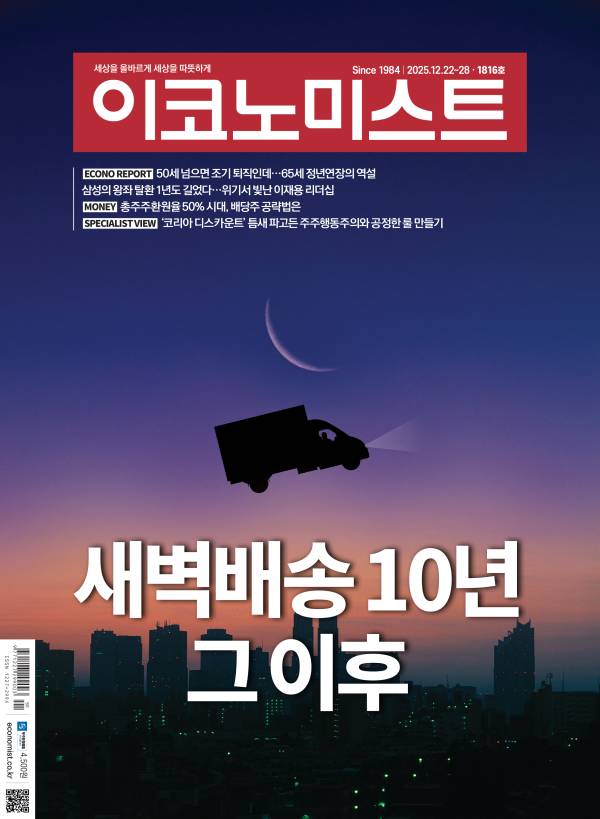
![면봉 개수 → 오겜2 참가자 세기.. 최도전, 정직해서 재밌다 [김지혜의 ★튜브]](https://image.isplus.com/data/isp/image/2025/12/21/isp20251221000019.400.0.jpg)
![갓 잡은 갈치를 입속에... 현대판 ‘나는 자연인이다’ 준아 [김지혜의 ★튜브]](https://image.isplus.com/data/isp/image/2025/11/21/isp20251121000010.400.0.jpg)
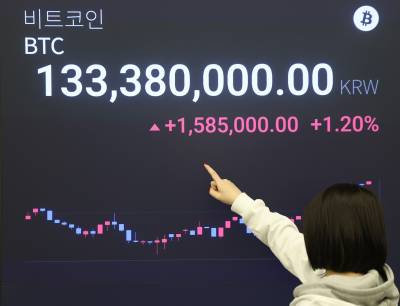
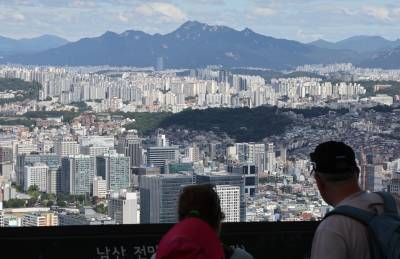
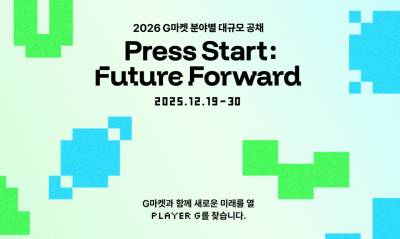
당신이 좋아할 만한 기사
브랜드 미디어
브랜드 미디어
S&P500 또 최고치…올해도 산타랠리 기대감↑[월스트리트in]
세상을 올바르게,세상을 따뜻하게이데일리
이데일리
일간스포츠
김연아 동경하던 '여고생 스노보더' 최가온, 이젠 월드클래스로 우뚝…올림픽 메달 정조준 [IS 스타]
대한민국 스포츠·연예의 살아있는 역사 일간스포츠일간스포츠
일간스포츠
일간스포츠
"연봉 1.5억인데 일할 사람 없어…차라리 폐업이 낫다"
세상을 올바르게,세상을 따뜻하게이데일리
이데일리
이데일리
환헤지 둘러싼 딜레마…해외 투자 큰손들 “안 하면 위험, 하면 비용”
성공 투자의 동반자마켓인
마켓인
마켓인
루닛, 다이이찌산쿄와 AI동반진단 도전...AI바이오마커 사업 전망은?
바이오 성공 투자, 1%를 위한 길라잡이팜이데일리
팜이데일리
팜이데일리